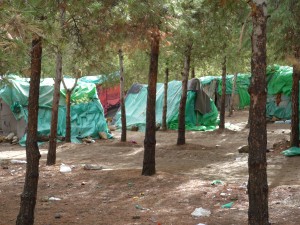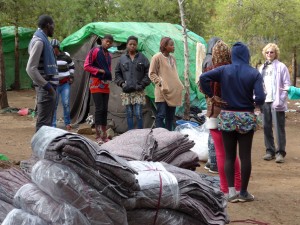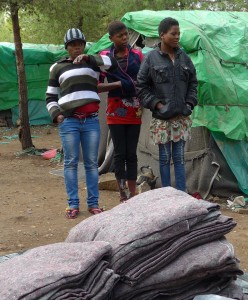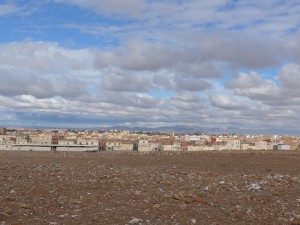You may have heard enough about migrants already, but we haven’t even scratched the surface. After leaving Empire camp, we drive to another camp in the Oujda forest. As we get out of the trucks and load up with packages of blankets, people come running down the hill to help us. They stop to shake our hands. One young woman named Helen puts her arms around her body and shakes herself, smiling, to demonstrate: “We are dying from the cold!” We carry the blankets to the edge of the camp, only to find the only people gathering are those who have helped us carry the blankets. Everyone else is out finding food for the community.

Lambert is the spokesperson for this community: the camp is named Lambert, after him. He has been in the forest for 13 years. When Karen asks, “Is it ok if we pray with you?” Lambert responds, “Prayer is the most important thing. God comes first.” The mood seems very different here, and I wonder whether the difference comes from Lambert’s guidance, or simply the fact that the camp is largely empty, so the scurrying to acquire goods is also absent. Still, Helen is quick to say, “We need food and nylon.” (Nylon is for the tent coverings.) Food will be coming next week, Héry promises.

Karen asks the people of this camp to tell us their stories. Helen (in tan) shrugs: “You know our story; we told you last time. It’s the same story.”
“But I want these people to hear your story, too.”
“You tell them,” says Helen.
“OK,” Karen says, “let me ask you questions. How long have you been here?” The answers trickle in: 1 year. 2 years. 8 months. 4 months.
Did you come up through Niger? Yes, everyone comes that way.
Did everyone on your trip survive the desert? Yes, on our trip, everyone survived. But sometimes not everyone makes it and that is how it is.
Did you come through Maghnia in Algeria? Yes.
How did you come from Maghnia to here? We walked, says Lambert. “We trekked,” Helen specifies. “A 3-4 hour trek.”
Are there any children here? Not now, but they are coming. Eight are coming. Everyone laughs; one young woman ducks over to stand by another as someone bats her on the stomach. Some of the babies who are coming do not show yet, but there are eight coming.

“Have you heard there are new policies?” Karen asks.
“Yes, we have heard,” Lambert says. “Now we are just waiting to see if they are true.”
Karen asks all the pregnant women if they will have their babies at the hospital. “It is very important … You know there is no problem now with the hospital?”
Lambert talks about the difficulty migrants have getting medicine and medical treatment.
“When Doctors without Borders were here, they gave us medicine for free. Since they left, it is much harder. Some people attacked me and cut my hand and I went to the hospital to get a prescription and they gave me a prescription and then I had to go and get the medicine and it cost 50 Euros, 500 dirhams, and I had to get this medicine 4 times, and I am living here, there is no way to earn this money.”

The city of Oujda in the distance. (As Moroccans say of Spain: So near, so far, so impossible.)
James has been talking to a man who made it all the way to Spain in 2006. He lived there for two years before he was caught one morning, crossing the street to buy cigarettes. They sent him back—back to Morocco? or Algeria? or all the way back to his home country?—and now he is trying to cross the border again. He has been in this camp for eight months, waiting for his chance to cross.
Another man comes to talk to us down by the cars. “I want to go back to my country. This is no way to live. My body is sound, my mind is sound, but there is no work. I go out at 5 a.m. to beg, and this is all I have received.” He pulls a plastic yogurt drink out of one pocket and scrap of bread out of another. “It shames me, this life. I want to go back to my country and begin my life anew.” He waves to us as we turn to get in the cars.
Suddenly a voice is calling, “Jeremy, Jeremy,” and then another man, wearing a red shirt and a black hat, comes running up to give Jem a farewell hug, his face alight with affection. This is so mysterious to me—that this man, in the midst of his struggles, has affection to spare; that Jeremy seems to evoke that affection in so many people here; that he can accept a hug and return it so easily. A multifaceted gift, that hug, in the midst of such hardship.